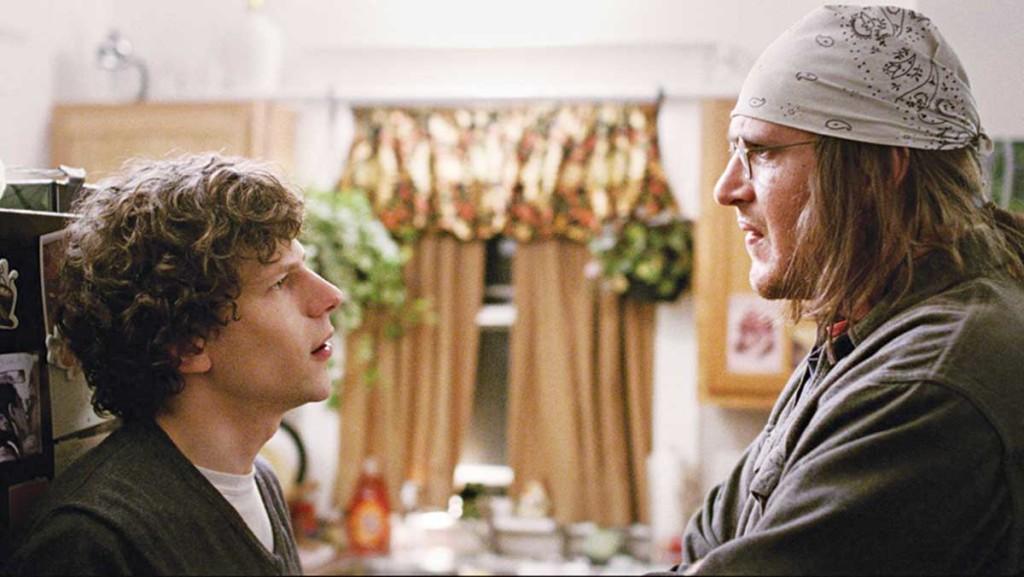It is very rare that a 1,079-page novel will take a country by storm, but that is exactly what David Foster Wallace’s “Infinite Jest” did. Wallace’s 1996 literary behemoth brought the spotlight upon his normally quiet and reserved life, which included numerous interviews and a 10-city book tour. The book became so highly acclaimed that Rolling Stone magazine sent new writer David Lipsky to follow Wallace on the final stop of his book tour. This was the first author Rolling Stone had decided to profile in 10 years, and that surprising event is the story director James Ponsoldt tells in his brilliantly moving film “The End of the Tour.”
Rolling Stone never ended up printing the profile on Wallace, and the events of the two Davids’ travels remained unknown to most until Lipsky released his 2010 best-seller “Although of Course You End Up Becoming Yourself: A Road Trip with David Foster Wallace,” which the movie insinuates Lipsky was prompted to write in the wake of Wallace’s suicide in 2008. The book was the basis for the film.
The movie’s slogan, “Imagine the greatest conversation you’ve ever had,” is exactly what Lipsky (Jesse Eisenberg) and Wallace (Jason Segel) have as the two writers’ embark upon a junk food–fueled journey from Wallace’s home in rural Illinois to Minneapolis, the last stop on Wallace’s book tour. The two talk about everything from “Die Hard” to dogs, depression to heroin, self-image and even a little bit about the book.
In the film, Lipsky, a published novelist himself, convinces his editor at Rolling Stone (Ron Livingston) to send him to Illinois in order to get a glimpse into the greatest literary mind of the late 20th century. From the moment they meet, Lipsky is incredibly envious of Wallace for his talent and success, but he is also appreciative and continuously amazed by Wallace’s brilliance. However, throughout their journey, Lipsky is simultaneously perplexed as he listens to his interview subject’s nonchalant and subdued perspective on life, stimulation and entertainment, all themes addressed in Wallace’s latest novel.
The vast majority of the film is solely composed of the dialogue between Wallace and Lipsky, as Lipsky records everything said throughout their five days together. Everywhere they go, Lipsky continues asking questions, thus continuing this incredibly lengthy, verbal journey occurring within their physical journey.
There are only four important supporting characters in the movie, but they all greatly impact the dynamic between the two writers. Sarah (Anna Chlumsky) is Lipsky’s girlfriend and a very big fan of Wallace’s writing. She is the one who suggests Lipsky read “Infinite Jest.” Joan Cusack plays Patty, Wallace’s escort around Minneapolis, and Mamie Gummer and Mickey Sumner play Julie and Betsy, respectively, two of Wallace’s friends whom he and Lipsky meet up with in Minneapolis.
The brilliance of the film is that much happens without much happening. The audience learns so much about these two men solely from hearing them talk to each other. While there are no cataclysmic events to keep the viewer enticed, the movie is never dull, and the mood of the film fluctuates with Wallace’s temperament. The movie is not about Wallace, but his relationship with Lipsky and the dynamic they share throughout their time together. However, Wallace still carries the plot because of his constant changes in behavior and attitude.
While Eisenberg is a talented actor, many of his characters throughout his career, both comedic and dramatic, seem very similar. Conversely, this was a complete change of pace for Segel as he goes from starring in “How I Met Your Mother” and “Forgetting Sarah Marshall” to portraying a complicated novelist who is very unsure of what he wants from his life. The character of Wallace is a complex mashup between a classic middle-American and a person more intelligent than most. He is both uncomfortable in his own skin and exactly sure of who he wants to be and how he wants to come off to people. Segel makes the jump from the world of comedy into this incredibly nuanced role and delivers an Oscar-worthy performance portraying one of the most complicated minds of the last 20 years.
Carefully riding the line between deep and depressing, “The End of the Tour” provides viewers with an insight into one of the most realized, troubled and intelligent literary minds of the 20th century. Embracing the beautiful simplicity of a great conversation, the film reminds viewers that one-on-one conversation is the best way to get to know someone.




















